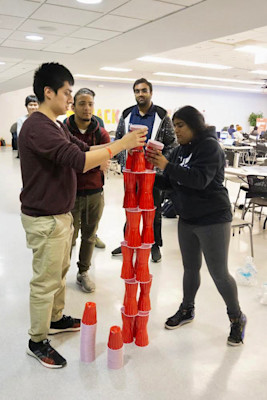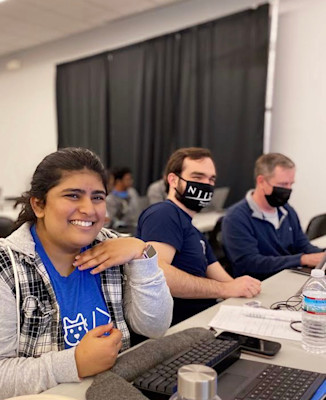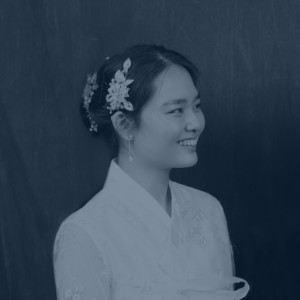Ayushi Sangoi, 23

Ayushi Sangoi’s career so far has been nothing short of impressive. A current PhD candidate at the Vision and Neural Engineering Laboratory at New Jersey Institute of Technology (NJIT) in collaboration with Rutgers University’s Health Science Campus, she has earned a dual degree in Biomedical Engineering and Computer Engineering, won several hackathons, and developed a reputation as a leader in her field, advocating for underrepresented groups in technology. She says her love for coding was sparked in high school, when she was selected for Karlie Kloss’ ultra-competitive Kode With Klossy coding camp. Learning to code with Ruby, HTML, and CSS helped her see the promise of technology in the biomedical world, and she was able to merge both of her passions.
By her sophomore year of college at NJIT in 2017, Ayushi had decided to add a second major in Computer Engineering. Wanting to dive right into the world of technology, when she heard about HackNJIT from her friends, she immediately signed up. “Since then, I have been hooked and have attended many more hackathons,” Ayushi says. At first, she was skeptical that she would fit in as an engineer with more experience in MATLAB than in Python—today, she has attended over 40 hackathons.
At Hack(H)er413, Ayushi secured her first hackathon win with a MATLAB project. She now enjoys using languages that are more popular with engineers than hackers, ensuring that her projects stand out. To Ayushi, “seeing the diversity of projects, especially hardware hacks,” is what inspired her to begin submitting her own projects at hackathons in the first place. She still fondly remembers being impressed by a pinball game made of pizza boxes. Her first hackathon project was a hardware hack, a boat she aptly named Frankenstein which would run based on the contractions of an Arduino-driven electrically stimulated frog leg.
When Ayushi first started competing at hackathons, she specifically submitted hardware hacks because she felt her coding skills were not up-to-par with her predominantly male classmates. However, with more experience, she has “come to appreciate hackers in all walks of life and experience.” Her latest win at HackNJIT involved hardware integrated with a primarily software project designed to help universities and domestic violence centers.
Today, Ayushi is doing her part to make an impact and make the hacker community even more inclusive. Recently, she was selected to be a campus facilitator for Kode with Klossy. As part of her role, she recruits women and gender non-conforming students to code in HTML and CSS. Focusing her efforts in her local area of Newark, New Jersey, she was able to recruit 12 students for her first workshop. Along with her co-facilitator, Ayushi has focused on empowering women in technology and encouraged their students to attend female-centric hackathons. “I believe recruiting girls and showing them early the importance of coding and the purpose of hackathons are some of my biggest impacts on the hacker community,” Ayushi says.
Quick Facts



Ayushi Sangoi, 23

Ayushi Sangoi’s career so far has been nothing short of impressive. A current PhD candidate at the Vision and Neural Engineering Laboratory at New Jersey Institute of Technology (NJIT) in collaboration with Rutgers University’s Health Science Campus, she has earned a dual degree in Biomedical Engineering and Computer Engineering, won several hackathons, and developed a reputation as a leader in her field, advocating for underrepresented groups in technology. She says her love for coding was sparked in high school, when she was selected for Karlie Kloss’ ultra-competitive Kode With Klossy coding camp. Learning to code with Ruby, HTML, and CSS helped her see the promise of technology in the biomedical world, and she was able to merge both of her passions.
By her sophomore year of college at NJIT in 2017, Ayushi had decided to add a second major in Computer Engineering. Wanting to dive right into the world of technology, when she heard about HackNJIT from her friends, she immediately signed up. “Since then, I have been hooked and have attended many more hackathons,” Ayushi says. At first, she was skeptical that she would fit in as an engineer with more experience in MATLAB than in Python—today, she has attended over 40 hackathons.
At Hack(H)er413, Ayushi secured her first hackathon win with a MATLAB project. She now enjoys using languages that are more popular with engineers than hackers, ensuring that her projects stand out. To Ayushi, “seeing the diversity of projects, especially hardware hacks,” is what inspired her to begin submitting her own projects at hackathons in the first place. She still fondly remembers being impressed by a pinball game made of pizza boxes. Her first hackathon project was a hardware hack, a boat she aptly named Frankenstein which would run based on the contractions of an Arduino-driven electrically stimulated frog leg.
When Ayushi first started competing at hackathons, she specifically submitted hardware hacks because she felt her coding skills were not up-to-par with her predominantly male classmates. However, with more experience, she has “come to appreciate hackers in all walks of life and experience.” Her latest win at HackNJIT involved hardware integrated with a primarily software project designed to help universities and domestic violence centers.
Today, Ayushi is doing her part to make an impact and make the hacker community even more inclusive. Recently, she was selected to be a campus facilitator for Kode with Klossy. As part of her role, she recruits women and gender non-conforming students to code in HTML and CSS. Focusing her efforts in her local area of Newark, New Jersey, she was able to recruit 12 students for her first workshop. Along with her co-facilitator, Ayushi has focused on empowering women in technology and encouraged their students to attend female-centric hackathons. “I believe recruiting girls and showing them early the importance of coding and the purpose of hackathons are some of my biggest impacts on the hacker community,” Ayushi says.
Quick Facts






